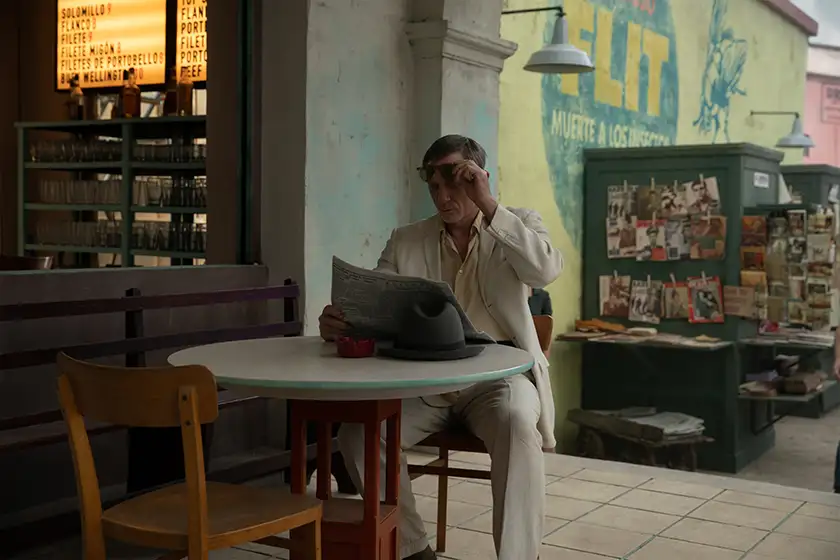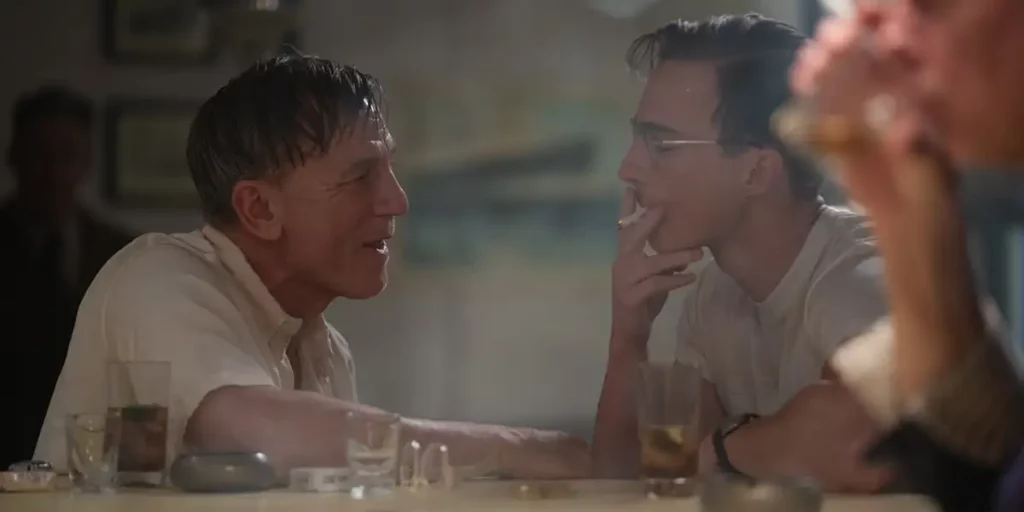Luca Guadagnino’s Queer is an exercise in exceptional filmmaking. It’s bold, raw and emotional, with a stunning central performance from Daniel Craig.
Director: Luca Guadagnino
Genre: Drama, Biography, History
Run Time: 135′
Venice World Premiere: August 3, 2024
U.S. Release Date: November 27, 2024
U.K. Release Date: TBA
As a filmmaker, Luca Guadagnino has a unique style. Queer feels like an amalgamation of the two distinct styles a film of his will usually fall into, and is a fantastic encapsulation of both. It’s incredibly sensual and centred around poignant emotional themes à la Call Me By Your Name, but also unapologetically weird and unafraid to take visual risks in the style of Suspiria. Perhaps this is Guadagnino finally meshing the two sides of his directorial flare, or perhaps it is the film that allows him the chance to be completely authentic.
Based on the novel of the same name by William S. Borroughs, Queer takes us to Mexico, in the early fifties, where William Lee (Daniel Craig) is drinking a lot, taking copious hard drugs, and engaging in illicit homosexual one-night-stands with anyone he can persuade into following him to a dingy motel. But then he meets Eugene Allerton (Drew Starkey, of Embattled), a young Navy man with whom he is almost immediately infatuated. After ‘spending time together’ for a while, Lee convinces Eugene to follow him around South America, as he goes on the search for a mystical, and possibly mythical, psychedelic journey.
Queer is split into three chapters and an epilogue. The first charts Lee’s pursual of Eugene, a clumsy and obsessive endeavour that borders on being a little too insistent. But there is a connection there, perhaps immediately or perhaps just inevitably, and the chemistry between Craig and Starkey is palpably intense. There’s a desperation to Lee that starts as a flicker and a suggestion, but becomes something much more tangible as their relationship evolves. When they sleep together it feels significant, like a change from the usual encounters Lee experiences and something that alters him, something that means more.
The second and third chapters chart their journey to South America and is where things take a turn for the strange. Guadagnino isn’t afraid to go bold with his visuals, using some trippy CGI to visualise thematical elements in a way that might polarise some audiences but will only add to the experience for those willing to go with it. The film deals much more directly with Lee’s addiction and the shifting dynamic between the pair of them, as well as loneliness, love, lust and what it means for them to be ‘queer’ in the latter chapters. It’s exploring their understandings of themselves and each other in a way that feels really visceral and poignant, even as it delves into more psychedelic imagery.

Queer as a whole has a sheen to it, an almost unreal quality that gives every location an almost set-like feeling. It feels simultaneously contained and full to burst, with the environment around its characters feeling a little stagnant and manufactured as they themselves are brimming with intense emotion. It’s a really interesting dichotomy, a simple yet effective detail in a film that’s full of them and committed to going for broke.
Daniel Craig is fantastic as Lee, free of inhibitions, vanity and restraint. As a heavy-drinking lout, his natural charisma avoids distastefulness. As an addict wracked with withdrawal, he’s pathetically and heartbreakingly vulnerable. And as a man discovering himself, he’s raw, open, and so engaging on screen. He has rarely ever been better on screen.
It is such a powerhouse performance that it risks overshadowing those around him, but the supporting cast more than hold their own. Jason Schwartzman and Lesley Manville, in what could have been one-note roles in the hands of lesser actors and a lesser filmmaker, give really memorable performances that elevate the few scenes that they are in. But the stand out by far is Starkey, whose Eugene is just as layered and complicated as Lee. He’s aloof and enigmatic, yes, but there’s a sensitivity and a confusion to him that blossoms as he follows Lee into the jungle (literally and figuratively). As individuals, Lee and Eugene are interesting and intriguing, but as a pair they’re chaotic and messy, with an awkwardly undefined but rigidly structured relationship that means something different to each of them and gives the film so much of its intensity and significance.
The use of music is another particularly bold aspect of Queer, with a score by Trent Reznor and Atticus Ross, as well as songs by Nirvana and Prince that are used pointedly and effectively. While it doesn’t eschew to period typical sounds, it doesn’t feel out of place either. The cinematography, by Sayombhu Mukdeeprom, is stunning in its attention to detail. From the way Lee walks through the Mexican streets to the way the camera captures his and Eugene’s most intimate moments, it feels exquisitely designed and never intrusive. It lets us in, but knows when to pull back and keep us out.
Queer feels like that as a whole: something made with care, passion, and emotion. It’s beautiful, messy, and raw, bold in its interpretations of themes just as Burroughs’ original novel was bold in its exploration of them. It might well be an encapsulation of what makes Luca Guadagnino such an exceptional, if slightly polarising, filmmaker. His vision and craft ensure each project goes for broke in a way that feels different and yet so uniquely him. Queer is fantastically expressive filmmaking from a master of the craft, with a creative team and cast to match.
Queer had its World Premiere at the Venice Film Festival on August 3, 2024 and will be released in US theaters on November 27, 2024. Read our review of Happy Holidays!

